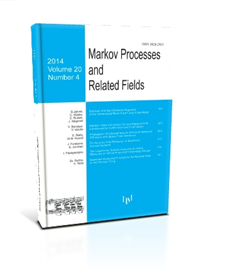Thermodynamical Limit and Propagation of Chaos in Polling Systems
F. Delcoigne, G. Fayolle
1999, v.5, Issue 1, 89-124
ABSTRACT
We consider a sequence $\{P^{(N)}, N \geq 1 \}$ of standard polling networks, consisting of $N$ nodes attended by $V^{(N)}$ mobile servers. When a server arrives at a node $i$, he serves one of the waiting customers, if any, and then moves to node $j$ with probability $p_{ij}^{(N)}$. Customers arrive according to a Poisson process. Service requirements and switch-over times between nodes are independent exponentially distributed random variables. The behaviour of $P^{(N)}$ is analyzed in thermodynamic limit, i.e. when both $N$ and $V^{(N)}$ tend to infinity, with $U\egaldef\lim_{N\rightarrow\infty}V^{(N)}/N$ and $ 0 < U < \infty $. First, ergodicity conditions are given. Then, combining the mean-field approximation approach together with weak convergence of Markov processes, the joint distribution (customers, vehicles) for an arbitrary finite number of nodes is explicitly characterized. In fact this distribution has a product form, which is the mathematical analogue of the propagation of chaos. The speed of convergence is also computed. In most of the study, $P^{(N)}$ is a fully symmetrical network, but a generalization is carried out for systems provided with only blockwise symmetry.
Keywords: chaos,network,polling,random walk,recurrence,transience,thermodynamic limit
COMMENTS
Please log in or register to leave a comment

